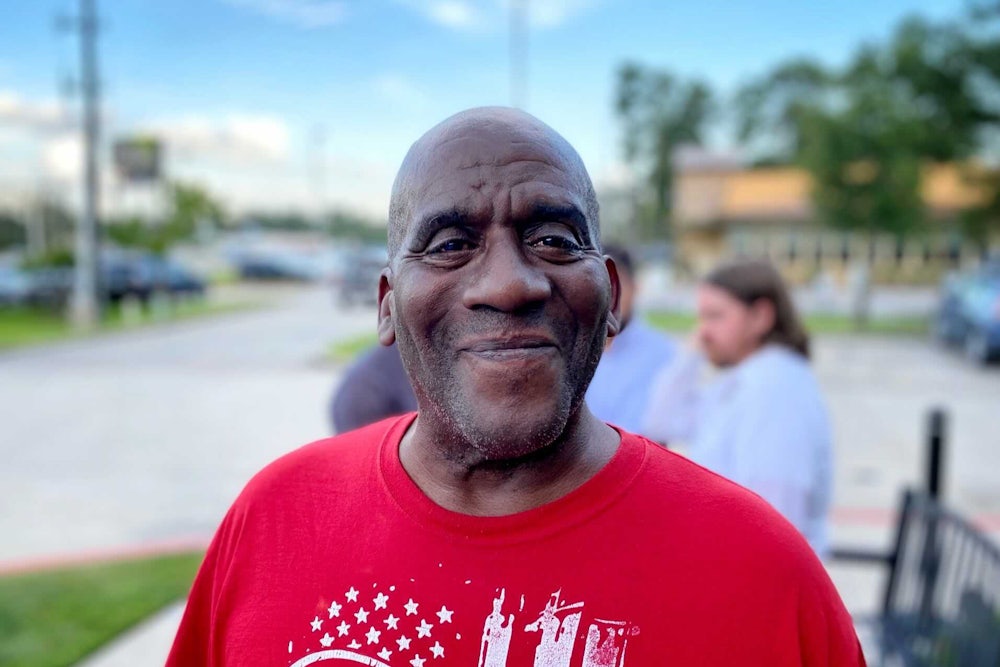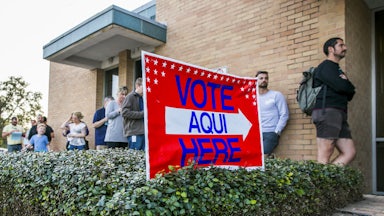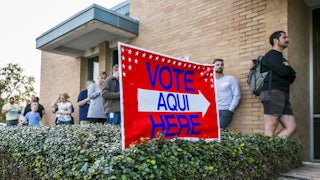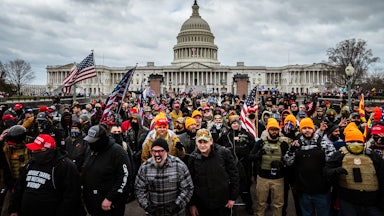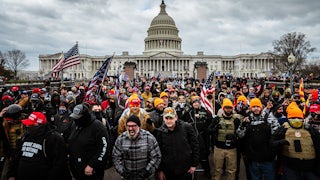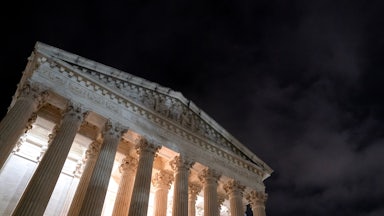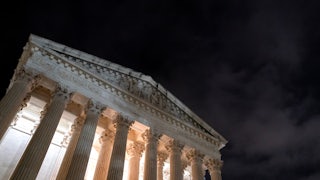The Republican Party has a problem. Former President Donald Trump and his allies in the party have spent the last eight months claiming that there was widespread fraud in last year’s presidential election. But there’s no evidence that anything actually went awry. No state official anywhere in the Union has uncovered any signs of significant voter fraud in their own results. Attorney General Bill Barr, who is hardly a Democratic stooge, has said that the Justice Department found no evidence of serious wrongdoing.
The absence of evidence hasn’t dimmed Trumpworld’s efforts to find something, anything, amiss with the results. Since the election, Trump’s lawyers have woven fantastical conspiracy theories that purport to explain how their immensely unpopular client received fewer votes than Joe Biden. Over the past few months, Trump-aligned state lawmakers in Arizona carried out a bizarre and partisan pseudo-audit of the state’s voting machines, which only succeeded in rendering them unusable for future elections. With Trump’s enthusiastic support, Republican lawmakers in other states are considering taking similar steps.
The latest scapegoat in this mass delusion is Hervis Rogers, a 62-year-old Texas man who was charged last week with illegal voting. Rogers received national attention during last year’s Super Tuesday primaries when he waited six hours in line to vote at a Harris County polling place. According to state prosecutors last week, he allegedly cast that ballot while still on parole for a 1995 burglary. Texas law forbids people with felony convictions from voting and exercising certain other civic rights until they’ve completed every part of their sentence.
Texas Attorney General Ken Paxton, a Republican who asked the Supreme Court to overturn the presidential election last fall, touted his efforts to defend the electoral system on social media. “Hervis is a felon rightly barred from voting under TX law,” Paxton wrote in a Twitter post while discussing an NPR article on Rogers’s case. “This liberal NPR article even says so, but buries it: ‘Rogers voted before his parole was scheduled to end, he was likely ineligible to cast a ballot on Election Day.’ I prosecute voter fraud everywhere we find it!”
If Rogers’s case is meant to be proof that voter fraud is a genuine scourge in American elections, it’s not very persuasive. If anything, his situation underscores the pernicious ways Texas and other states obstruct voters from participating in American democracy. But it also raises a more immediate question, one that’s particularly salient as many Republican-led states use the spectral fear of voter fraud to pass restrictive voting laws: Is this seriously the best that you’ve got?
Enter Hervis Rogers, whose adult life story reflects the draconian harshness of the American criminal justice system. According to NPR, Rogers received a 25-year prison sentence for burglary and intent to commit theft in 1995. It’s unclear exactly what was allegedly burgled that could justify locking away a man for a quarter of a century, but Rogers ultimately served nine years of the sentence in prison before being released on parole in 2004. He would have become automatically eligible to vote again under Texas law when his parole ended in June 2020.
Rogers’s lawyers told reporters that he didn’t know that he wasn’t allowed to vote when he cast a ballot before his parole ended last year. This is no minor detail in the case: Under Texas law, a defendant can only be convicted of illegal voting if they knew they weren’t eligible to cast a ballot at the time. Since Rogers was able to register to vote in the first place, which is no simple task in Texas, he may have reasonably concluded that he was eligible to do so.
Unfortunately for Rogers, his error took place in Paxton’s jurisdiction. The hard-right state attorney general has long used voter-fraud myths to burnish his conservative credentials. In recent years, Paxton has aggressively prosecuted Texans for minor breaches. One of his targets was Crystal Mason, who received a five-year prison sentence for casting a provisional ballot in 2016 while on supervised release. Mason is currently appealing her harsh sentence before the Texas Court of Criminal Appeals.
Other aspects of Rogers’s prosecution are troubling. As Popular Information’s Judd Legum noted on Monday, Paxton brought charges against him in neighboring Montgomery County instead of Harris County, where the charged offense allegedly took place. Legum reported that Texas law includes a peculiar provision that allows prosecutors to bring election-related charges in adjacent counties. That legal quirk allowed prosecutors to charge Rogers, who is Black, in an overwhelmingly white suburb of Houston instead of the more diverse city proper.
And then there’s the timing. Rogers’s high-profile arrest came on the eve of Texas Governor Greg Abbott’s announcement of a special legislative session. One of the session’s items is a sweeping package of voting restrictions that Texas Democrats defeated on procedural grounds last May.
The bills under consideration during the special session, House Bill 3 and Senate Bill 1, would add a slew of new voting restrictions to those already on the books, including new identification standards for mail-in voting, restrictions on early voting, and new criminal penalties for breaking election law. To prevent these measures from being enacted, nearly 60 Democrats from the Texas state House of Representatives have fled the state, in order to prevent that body from achieving a quorum of members necessary to advance legislation. The proposal is part of a national wave of efforts in Republican-led states to clamp down on the phantasmal threat of voter fraud and tilt elections even further in the GOP’s favor after Trump’s defeat.
“The arrest and prosecution of Mr. Rogers should alarm all Texans,” Andre Segura, the legal director of the American Civil Liberties Union of Texas, said in a statement on Friday. “He waited in line for over six hours to vote to fulfill what he believed to be his civic duty, and is now locked up on a bail amount that most people could not afford. He faces potentially decades in jail. Our laws should not intimidate people from voting by increasing the risk of prosecution for, at worst, innocent mistakes.”
Indeed, there may be more adjectives to describe how rare voter fraud is in the United States than actual cases of it. A Brennan Center for Justice compilation of reports and surveys on election integrity found vanishingly few individual cases on a national scale, as well as no evidence to suggest that voter fraud has affected the outcome of a modern American election. In December 2016, The Washington Post reported that a whopping four instances of voter fraud had been uncovered in that year’s election. “There wasn’t evidence of widespread voter fraud before the election,” the Post’s Philip Bump wrote. “There isn’t evidence of widespread voter fraud afterward, either. In fact, there’s not evidence of even modest voter fraud.”
That didn’t stop Trump from infamously and falsely asserting that he would have won the popular vote in 2016 if millions of illegal votes hadn’t been cast for Hillary Clinton. The voter-fraud myth was part of the Republican Party canon long before Trump bent the GOP to his will. But the former president’s toxic mélange of personal insecurity, authoritarian instincts, and deep unpopularity made him more willing than most to claim that American elections were essentially illegitimate. Paxton and other influential figures within the GOP have proven to be more than willing to follow that false premise to its logical conclusion.
But there isn’t some vast voter-fraud conspiracy that’s been rigging elections in Democrats’ favor, and they won’t find any evidence to suggest otherwise. So the best that Trump and his allies can do is lash out at people like Hervis Rogers. Because of his previous conviction in 1995, the 62-year-old man could face decades behind bars if convicted again, which could effectively amount to a life sentence. In the days after the 2020 election, an anonymous Republican official, asked by The Washington Post about Trump’s then-burgeoning interest in casting doubt over the integrity of the election, responded, “What’s the downside for humoring him this little bit of time?” Whoever that was, now they know.
